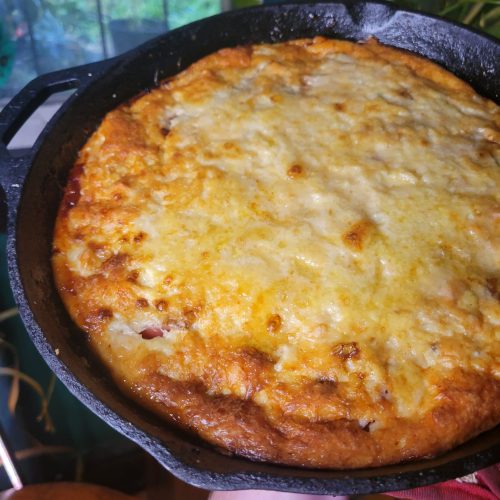
Quiche w/ Salmon, Leeks, & SnapDragon Apples
This Salmon Quiche consists of SnapDragon apples, sautéed leeks, salmon, eggs, Greek yogurt, Dijon mustard, and gruyère cheese.
Equipment
- Large Bowl
- Cast Iron Pan (or Baking Dish)
- Oven
Ingredients
- 6 oz. salmon
- splash olive oil
- 1 lemon sliced
- 1 leek sliced & caramelized
- 6 eggs
- 1½ c. Greek yogurt
- 1½ tsp. Dijon mustard
- dash salt
- dash pepper
- 2 apples sliced (I used SnapDragon)
- 1 c. gruyère grated
Instructions
Bake Salmon
- Preheat oven to 450° Fahrenheit.
- Place salmon skin-side down on a baking sheet.I usually use a cast iron griddle. However, the exact cooking method isn't as important here because you're just going to blend them together. If you don't have a nonstick pan or you want an easier cleanup, you can line it with aluminum foil.
- Drizzle with olive oil and add a dash of salt and pepper. Slice a lemon and place evenly on top of the salmon.You want just enough lemon and oil to cover the top of the salmon and keep it from burning as the inside cooks. Salmon is already an oily fish, so use sparingly.
- Bake the salmon for 12-17 minutes, or until it begins to flake. Salmon tends to be cooked when it loses the bright color and you can take a fork and it easily separates. Remove from the oven and let cool.
Sauté Leeks
- Preheat skillet on medium heat with a splash of oil.
- Add finely sliced leeks to a skillet and cook until softened, making sure to stir occasionally. I cooked mine for about 10-15 minutes. Although this time can vary depending on how much produce you have, how often you stir it, and personal preference for doneness.
Prepare Quiche
- Turn oven down to 350 degrees Fahrenheit.
- Arrange sliced apples and leeks across the bottom of the baking dish.
- When the salmon is cool enough to touch, flake into smaller pieces and mix in with eggs, Greek yogurt, and another dash of salt and pepper.
- Pour the egg mixture into a cast iron skillet or baking dish.I use fairly well seasoned cast iron for the vast majority of my cooking. These you don't necessarily need to oil because they already contain enough in the coating. Although adding a little oil or butter beforehand can prevent sticking, especially in other types of dishes.
- Bake for 50-60 minutes, or until just set and lightly brown. You want the egg to still juggle slightly, but not be liquid.
- Serve immediately or chilled. Quiche is a great recipe to make ahead of time because it keeps well and is just as good cold. If you do reheat it, though, I would recommend heating in the oven. Oftentimes egg dishes don't microwave well as this tends to overcook them.
Tips, Tricks, & Notes
- For more information on baking salmon, check out my article on The Fundamentals of Oven Baked Salmon. I'm particularly fond of cooking on a well-seasoned cast iron griddle because you don't need additional oil or foil to to keep it from sticking. But there are certainly ways around this if you don't want to dedicate an entire cast iron pan to fish! Cooking salmon is also more of an art than a science. No two filets are going to cook in the exact same amount of time and there are definitely some tips and tricks to nailing the cook on fish.
- I also have an entire article on The Fundamentals of Crustless Quiche with more tips and tricks on whether or not you want a crust, whether or not you need dairy or cheese, the type of pan to use, and a recommendation of toppings.